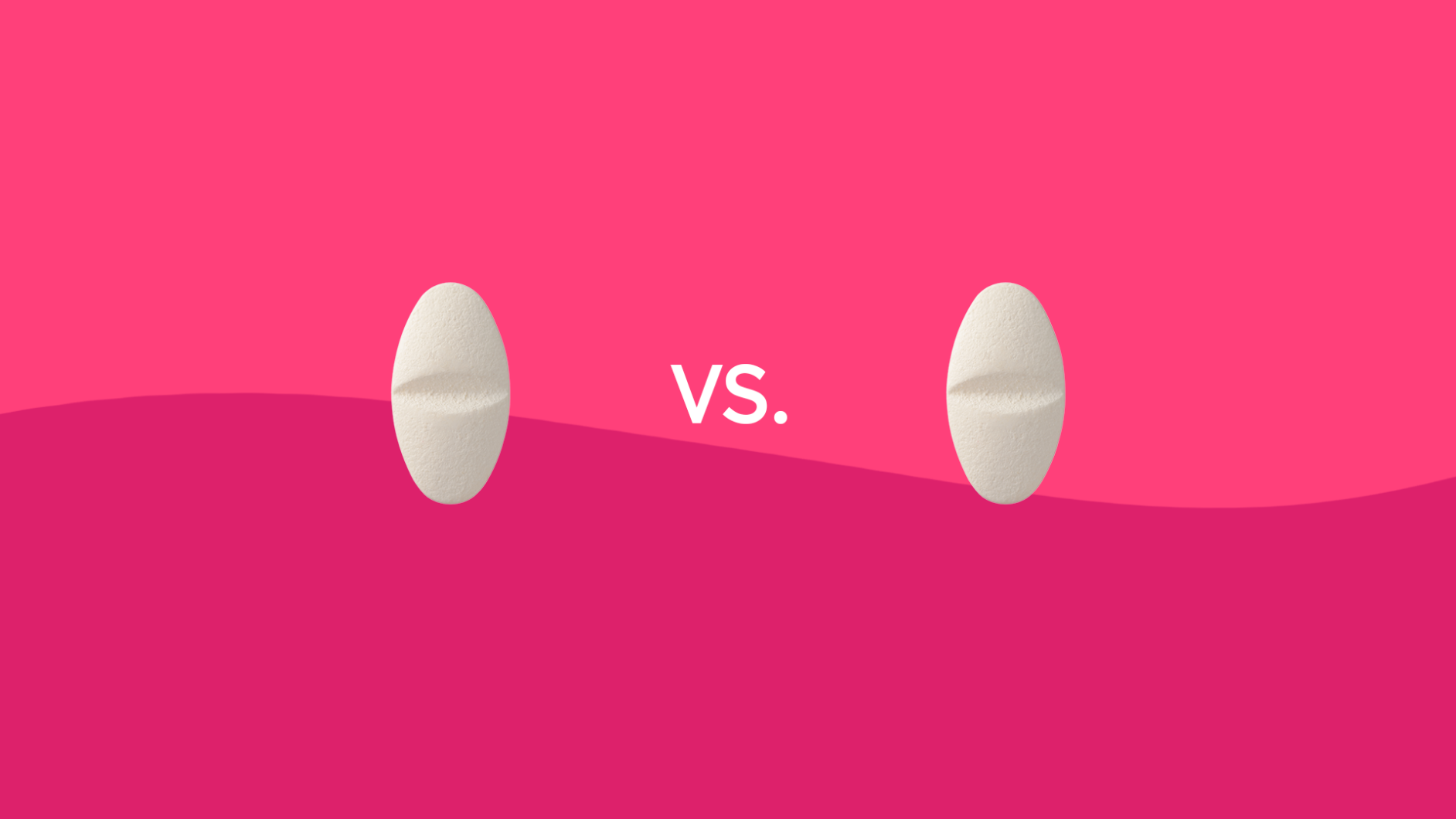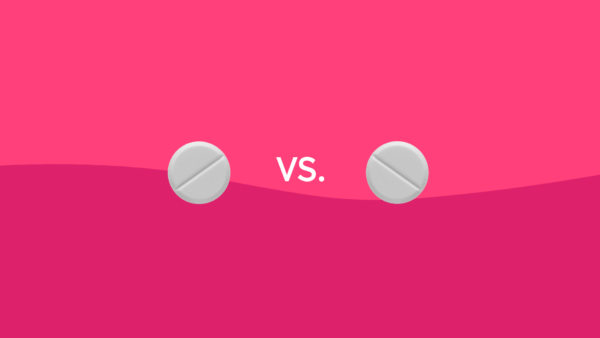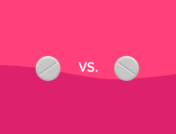Drug overview & main differences | Conditions treated | Efficacy | Insurance coverage and cost comparison | Side effects | Drug interactions | Warnings | FAQ
Effexor and Lexapro are two medications used in the treatment of both major depressive disorder (MDD) and generalized anxiety disorder (GAD). Symptoms of depression may include low mood for at least a two-week period and loss of interest in normal activities.
Generalized anxiety is characterized by excessive worry about a variety of issues including money, health, family, and work occurring more days than not for the past six months. Both MDD and GAD affect millions of Americans, and adequate treatment is important for quality of life. Treatment of depression or anxiety may include increased physical activity, meditation, or psychotherapy. Some cases will require medication for effective treatment.
What are the main differences between Effexor and Lexapro?
Effexor (venlafaxine) is a prescription medication indicated in the treatment of both MDD and GAD. Effexor belongs to a group of antidepressants known as selective serotonin-norepinephrine reuptake inhibitors (SNRIs). Effexor blocks the reuptake of both norepinephrine and serotonin in the neuron synapse, effectively leaving more free serotonin and norepinephrine available. These neurotransmitters play a positive role on mood and affect. Other SNRIs you may be familiar with are Cymbalta (duloxetine) and Pristiq (desvenlafaxine).
Effexor (What is Effexor?) is available in immediate-release tablets in strengths of 25 mg, 37.5 mg, 50 mg, 75 mg, and 100mg. It is also available in extended-release tablets and capsules in strengths of 37.5 mg, 75 mg, and 150 mg. The extended-release tablet also comes in a 225 mg strength.
Lexapro (escitalopram) is also a prescription medication indicated in the treatment of both MDD and GAD. Lexapro belongs to the group of antidepressants known as selective serotonin reuptake inhibitors (SSRIs) and works by blocking the reuptake of serotonin at the neuronal membrane transport pump. This action leaves more free serotonin in the neuron synapse, and higher serotonin levels are associated with a better mood. Other SSRIs you may be familiar with include Prozac (fluoxetine), Zoloft (sertraline), Celexa (citalopram), or Paxil (paroxetine).
Lexapro (What is Lexapro?) is available as an oral tablet in strengths of 5 mg, 10 mg, and 20 mg. It is also available as an oral solution in a 5 mg/5 ml concentration.
| Main differences between Effexor and Lexapro | ||
|---|---|---|
| Effexor | Lexapro | |
| Drug class | Selective serotonin-norepinephrine reuptake inhibitor | Selective serotonin reuptake inhibitor |
| Brand/generic status | Brand and generic available | Brand and generic available |
| What is the generic name? | Venlafaxine | Escitalopram |
| What form(s) does the drug come in? | Tablet, extended-release capsule, and tablets | Tablet and oral solution |
| What is the standard dosage? | 75 mg XR once per day | 10 mg once per day |
| How long is the typical treatment? | Indefinite | Indefinite |
| Who typically uses the medication? | Adolescents and adults | Adolescents and adults |
Want the best price on Lexapro?
Sign up for Lexapro price alerts and find out when the price changes!
Conditions treated by Effexor and Lexapro
Effexor and Lexapro are both indicated in the treatment of major depressive disorder and generalized anxiety disorder. Effexor also carries indications for both social phobia and panic disorder. There are some off-label uses of both drugs as well. Off-label use is when a drug is prescribed for an indication not approved by the Food and Drug Administration (FDA). Effexor has been used without approval in obsessive-compulsive disorder (OCD), premenstrual dysphoric disorder (PMDD), and hot flashes related to menopause. Lexapro is sometimes used off-label for conditions such as OCD, bulimia nervosa, and binge eating.
The following chart provides a list of conditions treated by Effexor and Lexapro. It may not include all potential uses, and you should always consult with your healthcare professional to see if one of these drugs is right for you.
| Condition | Effexor | Lexapro |
| Major depressive disorder | Yes | Yes |
| Generalized anxiety disorder | Yes | Yes |
| Social phobia | Yes | No |
| Panic disorder | Yes | Off-label |
| Obsessive-compulsive disorder | Off-label | Off-label |
| Premenstrual dysphoric disorder | Off-label | Off-label |
| Hot flashes due to menopause | Off-label | No |
| Bulimia nervosa | No | Off-label |
| Binge eating | No | Off-label |
| Post-traumatic stress disorder | No | Off-label |
| Premature ejaculation | No | Off-label |
Is Effexor or Lexapro more effective?
A meta-analysis compared Effexor, Lexapro, and several other common antidepressant drugs based on efficacy and tolerability in 117 randomized trials over a 16-year period. The results found that both Effexor and Lexapro were similarly effective at treating depression, and both were more effective than many other antidepressant medications. However, Effexor’s side effect profile may make it more difficult to tolerate than Lexapro. This may lead prescribers to attempt treatment with Lexapro before attempting Effexor.
Coverage and cost comparison of Effexor vs. Lexapro
Effexor is a prescription-only medication that is typically covered by both commercial and Medicare insurance plans. The out-of-pocket price for a 30-day supply of Effexor XR 75 mg can be as much as $146. With an Effexor coupon from SingleCare, you can purchase the generic for around $15.
Lexapro is also a prescription medication that is typically covered by both commercial and Medicare drug plans. The out-of-pocket price for a 30-day supply of Lexapro 10 mg can cost nearly $200. SingleCare offers a coupon for generic Lexapro, which can lower the price to approximately $15 at participating pharmacies.
| Effexor | Lexapro | |
| Typically covered by insurance? | Yes | Yes |
| Typically covered by Medicare Part D? | Yes | Yes |
| Standard dosage | 30, 75 mg XR capsules | 30, 10 mg tablets |
| Typical Medicare copay | Less than $10 | Less than $10 |
| SingleCare cost | $15+ | $15+ |
Common side effects of Effexor vs. Lexapro
Effexor and Lexapro both have side effects that may potentially have an effect on patient compliance. Each of these drugs are slow to have an effect on the disorders they are treating, sometimes taking anywhere from two to six weeks to show an impact on symptoms. Patients may experience bothersome side effects before they experience a remission in symptoms of their disorder. This can lead to patients discontinuing therapy too soon, and their disorder goes untreated. It is important for patients to be aware of the potential side effects before starting treatment.
Effexor has a much more pronounced effect on sleep than Lexapro. Almost 18% of patients reported insomnia, the inability to fall and stay asleep, while on Effexor. Only 4% of patients reported this adverse event with Lexapro. These drugs may also cause somnolence, or excessive drowsiness. Effexor is more likely to cause somnolence with 7.5% of patients reporting somnolence as compared to 2% with Lexapro. Sleep affects the quality of life and these side effects are an important consideration prior to starting therapy.
Digestive side effects have also been reported with both drugs. Effexor is more likely to cause incidences of nausea, diarrhea, and constipation than Lexapro, though these side effects can happen with either drug.
Decreased libido, or sexual drive, is more likely to be negatively affected by Effexor than by Lexapro. It is important to have quality of life discussions with patients who are experiencing this side effect.
This table is not intended to be a complete list of potential side effects. Please consult a medical professional for a complete list.
| Effexor | Lexapro | |||
| Side effect | Applicable? | Frequency | Applicable? | Frequency |
| Nausea | Yes | 11.8% | Yes | 7% |
| Dry mouth | Yes | 5.3% | Yes | 5% |
| Sweating | Yes | 2.9% | Yes | 2% |
| Diarrhea | Yes | 7.7% | Yes | 5% |
| Constipation | Yes | 3.4% | Yes | 1% |
| Dizziness | Yes | 15.8% | Yes | 3% |
| Insomnia | Yes | 17.8% | Yes | 4% |
| Somnolence | Yes | 7.5% | Yes | 2% |
| Increased blood pressure | Yes | 3.4% | No | n/a |
| Decreased appetite | Yes | 9.8% | Yes | 1% |
| Decreased libido | Yes | 5.1% | Yes | 1% |
Source: DailyMed (Effexor) DailyMed (Lexapro)
Drug interactions of Effexor vs. Lexapro
Effexor and Lexapro each work by increasing available serotonin. When one of these drugs is combined with other drugs that have serotonergic activity, it increases the chance that a patient may experience serotonin syndrome. Serotonin syndrome is a condition caused by having too much free serotonin and can lead to increased blood pressure and heart rate, agitation, and dizziness. Drugs with serotonergic activity include the pain medication tramadol and a supplement often used by patients for mood, St. John’s Wort. Other classes of medication may interact in this manner as well, so it is important for your doctor and pharmacist to have a complete list of medications you are taking.
Ondansetron, when taken with Effexor or Lexapro, may increase the incidence of QT prolongation and a type of arrhythmia known as torsades de pointes (TdP). Each of these drugs carries a risk for these cardiac events, but their combined use increases the risk significantly. These cardiac events can be fatal in some cases, and the combination of these drugs with Ondansetron should be avoided when possible.
This is not intended to be a complete list of potential drug interactions. Consult your doctor or pharmacist for a complete list.
| Drug | Drug class | Effexor | Lexapro |
| Almotriptan Eletriptan Oxitriptan |
5HT Agonist/triptans (antimigraine agents) | No | Yes |
| Amphetamine salts Dexmethylphenidate Methylphenidate |
Amphetamines | Yes | Yes |
| Ondansetron | 5HT3 Antagonists (anti-nausea agents) |
Yes | Yes |
| Apixaban Edoxaban |
Antiplatelets | Yes | Yes |
| Aripiprazole | Antipsychotic | Yes | Yes |
| Aspirin Ibuprofen Naproxen Diclofenac |
Nonsteroidal anti-inflammatory drugs (NSAIDs) | Yes | Yes |
| Bemiparin Enoxaparin Heparin |
Anticoagulants | Yes | Yes |
| Buspirone | Antianxiety | Yes | Yes |
| Carbamazepine | Anticonvulsant | No | Yes |
| Esomeprazole Omeprazole |
Proton pump inhibitor | No | Yes |
| Fluconazole | Antifungal | Yes | Yes |
| Fluoxetine Duloxetine Paroxetine Sertraline |
SSRIs | Yes | Yes |
| Hydroxychloroquine | Aminoquinolone/ Antimalarial |
Yes | Yes |
| Linezolid | Antibiotic | Yes | Yes |
| Pimozide | Antipsychotic | Yes | Yes |
| Selegiline Phenelzine Rasagiline |
Monoamine oxidase inhibitor (MAOI) | Yes | Yes |
| St. John’s Wort | Herbal supplement | Yes | Yes |
| Hydrochlorothiazide Chlorthalidone Metolazone |
Thiazide diuretics | No | Yes |
| Tramadol | Opiate pain reliever | Yes | Yes |
| Amitriptyline Clomipramine Doxepin Nortriptyline |
Tricyclic antidepressants | Yes | Yes |
| Bupropion | Dopamine/ norepinephrine reuptake inhibitor | No | Yes |
Warnings of Effexor and Lexapro
Effexor and Lexapro are used to treat mental health disorders such as major depression and generalized anxiety. The effects of Effexor and Lexapro are not immediate. It may take between two and six weeks to see any effect from the drugs. It is important to understand that the remission of symptoms may not be immediate, and patients should be encouraged not to discontinue treatment without first consulting their prescriber.
Patients with depression may experience a worsening of symptoms or suicidal thoughts whether or not they are taking antidepressant medications. These conditions may worsen until remission is achieved. Effexor and Lexapro therapy may increase suicidal ideation and thoughts among teens and young adults, especially in the early stages of treatment before any type of remission is achieved. These patients must be monitored closely, and a change may be necessary if symptoms suddenly arise or get worse.
Serotonin syndrome has been associated with the use of Effexor, Lexapro, and other similar antidepressant medications. It is associated with too much free serotonin and can cause increased heart rate, agitation, and dizziness. The risk of serotonin syndrome is increased when other serotonergic drugs are used with Effexor or Lexapro.
Effexor and Lexapro should not be stopped suddenly or without your prescriber’s knowledge. Stopping these medications suddenly may lead to withdrawal symptoms such as headaches, dizziness, fatigue, and irritability.
Frequently asked questions about Effexor vs. Lexapro
What is Effexor?
Effexor is a prescription antidepressant medication used in the treatment of major depression and generalized anxiety disorder. It works by increasing free serotonin and norepinephrine. Lexapro is available in immediate and extended-release tablets, and extended-release capsules.
What is Lexapro?
Lexapro is a prescription antidepressant medication used in the treatment of major depression and generalized anxiety disorder. It works by increasing free serotonin. Lexapro is available as an oral tablet and an oral solution.
Are Effexor and Lexapro the same?
While both Effexor and Lexapro treat depression and anxiety, they are not the same. Effexor blocks the reuptake of both serotonin and norepinephrine in the neuronal synapse, while Lexapro blocks only serotonin reuptake.
Is Effexor or Lexapro better?
Effexor and Lexapro have been shown to be comparable in terms of efficacy in treating depression, however, studies suggest that Lexapro may be easier to tolerate. Patients on Lexapro are less likely to discontinue treatment early.
Can I use Effexor or Lexapro while pregnant?
The Food and Drug Administration (FDA) considers both Effexor and Lexapro to be in pregnancy category C, meaning there have not been adequate human studies to determine safety. The use of these drugs should be limited to use when the benefits clearly outweigh the risks. Both Effexor and Lexapro should be avoided in breastfeeding mothers as well.
Can I use Effexor or Lexapro with alcohol?
Alcohol can increase the adverse effects of both Effexor and Lexapro. Drinking alcohol while taking these drugs can cause significant psychomotor impairment, and for this reason, patients are advised to avoid alcohol if taking these drugs.
Is Effexor the best antidepressant?
Effexor has been shown to be just as effective, if not more, than most other antidepressant drugs. However, it may be more difficult to tolerate for patients. Your doctor will decide which treatment option is best for you.
What is the difference between Effexor and venlafaxine?
Venlafaxine is the generic name of Effexor, which is a brand name product. Generic venlafaxine products are considered substitutable for Effexor by the FDA.
Does venlafaxine calm you down?
While some patients may experience somnolence while on Effexor, it is also known to cause agitation and tremor in some patients. Talk with your physician to determine if this drug may be right for you.
Does Effexor affect memory?
Amnesia has been reported in a small number of patients taking Effexor products. If you notice this adverse event, let your prescriber know immediately as a change in therapy may be warranted.





